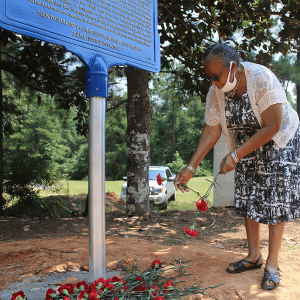
Carol Kuruvilla is a religion reporter based in the New York City area.
Posts By This Author
The Sacred Work of Remembering Lynching Victims
THERE ARE TWO churches in Newton County, Miss., that bear the name “Good Hope.” The first, Good Hope Baptist Church, was founded by white slaveholders in the 1850s. At least 20 African Americans were members of that church, forced to worship God alongside those who kept them enslaved. After the Civil War, Black members of the church banded together to form an independent community, the Freedman Settlement of Good Hope. One of their first goals as emancipated people was to establish a church of their own. Against immeasurable odds, they founded Good Hope Missionary Baptist Church in 1908. But that same year, terror threatened to rip the nascent community apart. Three congregants—William Fielder, Dee Dawkins, and Frank Johnson—were brutally tortured and lynched by a mob of at least 50 white men. The three were targeted for being associated with a Black sharecropper accused of killing his white employer. The mob went on to wreak havoc on Black neighborhoods. Traumatized by the violence and faced with restrictive Black codes that preserved white supremacy in the South, many members of the Freedman Settlement of Good Hope fled north.
But their families’ connection to that sacred ground didn’t waver. For more than 100 years, on the first Saturday in August their descendants have travelled from across the U.S. to the church for a revival. They sing, pray, and gather for a fish fry and soul food. They share news about marriages, births, and deaths. They listen to sermons and care for the cemetery where their ancestors are buried. And most importantly, they remember.
Last August, descendants gathered at Good Hope Missionary Baptist Church in Newton County for another reason: to unveil a historical marker honoring the memories of Fielder, Dawkins, and Johnson. The marker describes the terror that was unleashed on their community and the failure of local law enforcement to hold anyone accountable for the deaths and the destruction of Black property. Darrell Fielder, the great-great-grandson of William Fielder, told Sojourners he believes Good Hope Missionary Baptist Church was the appropriate space for “resurrecting” the legacies of these three victims. “It is the one space where Black people could practice a liberating faith and speak in frank terms about injustices,” Fielder said. “In placing these markers on church ground, we are honoring these martyrs and letting them know that God was always with them.”
